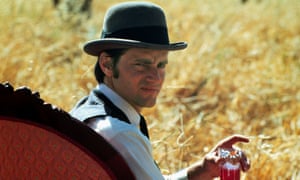Her dark hair is wispy and her glances are often sidelong and furtive, betraying shyness as well as suspicion. One moment, she seems anxious and guarded; the next, relaxed and forthcoming.
"There are definitely two sides to my personality," she admits. "Part of me is childish, playful, dependent. Another part is fiercely independent and protective."
The tension between these two sides is at the heart of her success as an actress. She was brilliant on the London stage as Blanche DuBois in A Streetcar Named Desire, perfectly capturing the torment of a woman caught between the demands of genteel respectability and raging desire. Some of the same tension was also apparent in her celebrated Broadway performances as Nora in A Doll's House.
But in her private life she has suffered from what her friend Gore Vidal describes as her "neurotic" temperament. When I repeat Vidal's succinct commentary on her relationship with Philip Roth - "He's tense; she's tense" - she laughs nervously, but does not deny the accuracy of the description.
Part of the difficulty in her tumultuous love life is that she has been drawn so often to men whose anxieties and obsessions mirror her own. Her first husband, the actor Rod Steiger, didn't seem to know whether he wanted his wife to be a free spirit or an accessory to his own career. They had a child - Anna, now 42 and an opera singer - but the marriage soon collapsed when Bloom found herself attracted to one of her husband's friends, the producer Hillard Elkins.
She now acknowledges that her marriage to Elkins was an enormous mistake and describes him as having "an air of fearful anxiety", yet she was only too willing to join him in a stormy relationship, playing the "child-daughter" to his father-lover.
Significantly, her own father was largely absent from her life. It was her mother who inspired her to pursue an acting career, while her father drifted from job to job and place to place before disappearing from her life. In her childhood she was never quite certain what her father did for a living. "I later found out from my birth certificate that he described himself as a tie salesman, but I have no idea if he actually sold a tie."
After her father abandoned the family, Claire and her brother, John, lived with their mother in greatly reduced circumstances, made worse by the privations of the war. She still has vivid and painful memories of the period.
"It was so dreary and bleak, with rationing and bad food. I came to resent not only the poverty that we saw around us, but the whole caste system of Britain that made any escape from such poverty so difficult. Although you might get a taste of success, you still felt enclosed and unable to move ahead. I couldn't wait to get out of England."
Her chance came in the early Fifties, when her budding career as an actress attracted the attention of Charlie Chaplin, who flew her to New York to audition for a starring part in his film Limelight. He liked what he saw and showered attention on her, generously sharing the cover of Time magazine with her when the film was launched. Suddenly, Hollywood wanted her and she made several big films in America, including The Buccaneer with Yul Brynner.
"I had acting jobs in London, but I wanted to be in America. For me, the one bright thing about England in those days was a Welshman."
She is referring to the first great love of her life, Richard Burton, who starred opposite her in Hamlet at the Old Vic. Unfortunately, he was married at the time and she was never able to enjoy more than brief periods with him.
The fact that their love was frustrated and finally faded is still a source of pain to her, and she does not have much sympathy for Elizabeth Taylor, who eventually lured him into a second marriage. There seems little doubt that he was the favourite of all her lovers.
"He had it all: intelligence, physical beauty, an incredible voice. There was no one else like him. When we were at the Old Vic, he proved that a working-class actor could make it, and I was proud of him. I thought he set a great example in a society that was, and still is, so preoccupied with class and accent."
Her resentment of social distinctions is such a favourite theme that she can't resist interrupting her praise of Burton to deliver a sharp dig at the Queen: "As long as people continue to bow to an uncultivated woman, the caste system will continue."
It is not surprising that she soon drifted away from Britain and made her new home in America, first with Steiger in balmy Malibu and then with Elkins in New York. It was during her early days in New York that she met Roth, who was immediately drawn to her.
"We liked many of the same things. We're both Jewish and bookish. I suppose, at one level, it was a kind of tribal connection that made us fall for each other."
But the relationship grew with painful slowness because Roth was both wary of marriage and deeply jealous of losing Claire's affection. He made it difficult for her to pursue her career and tried to dominate every aspect of her life. So intense was his jealousy that he turned against her daughter, Anna, insisting that the girl was a distraction and consumed too much of Claire's attention.
When Anna was 18, Roth demanded that she leave their house. Claire agonised over his demand but, to her regret, gave in to it.
"He didn't like having her around. It was as simple as that. They are two people with very strong personalities and I couldn't find a way to bring them together. So Anna left. It was a terrible mistake, and she and I have resolved this question only after much difficulty."
Now that Roth is gone, how do relations between mother and daughter stand today?
"She is the most wonderful woman I know and we are very close again. She is so good for me in so many ways. She keeps my head on straight. When I go over the line, she will put me in my place by saying, `Oh, Mom, that's so actressy'."
It took almost 20 years for Bloom to get Roth out of her system. They spent years feeding each other's anxieties and debating their future, and the question of marriage was put off again and again. They lived together in a state that varied from open hostility to quiet domesticity. She tolerated his many emotional outbursts and depressions and nursed him through several illnesses.
"But our love was always doomed to fail. I see that now. Philip can't endure relationships that go on peacefully. He needs controversy and conflict and abrasion. We had many good times, but they were always followed by some outbreak of anger and guilt."
In a vain effort to save their relationship, Claire proposed marriage to Philip. He hesitated, but finally accepted the offer. Their union lasted only three years. And when he turned against her, it was with a vengeance, threatening expensive legal actions and sending angry letters of recrimination.
In 1996, she struck back by turning his instrument of power - the pen - against him. She wrote a brutally candid memoir of their life together and took a literary swipe at him in the title by calling the book Leaving a Doll's House. Over many pages, she details her case against him, attacking him for his selfishness and ingratitude. For her pains, she was criticised in some reviews for airing her dirty laundry in public.
"My crime was that I blew the whistle on Philip Roth. I thought what I was doing was giving the world a truthful picture. Much of it was bad, but there was also great love between us and I tried to convey the spirit of that love."
It is difficult to see the love in her memoir when so much mad obsession seems to swirl around it. He emerges from the book as a nasty, lonely misogynist whose supposed genius hardly serves as an excuse for his wild tantrums and petty cruelties. Bloom seems to think his genius partly redeems him, but it may well be that his self-indulgent fictions will not be read by anyone in 50 years. In which case, she suffered for nothing.
But that bleak view is not one that she is willing to accept. What is most amazing about Claire Bloom, six years after she declared her independence from Roth, is that she still can't seem to let him go.
The more we talk about him, the more she seems to yearn for him, speaking wistfully about their house in Connecticut and reports of his comings and goings in the literary world. In fact, much of her willingness to wash her hands of men seems to be based on the notion that no one else but Roth can suit her. After describing some of their good times together, she says, ruefully, "He is a hard act to follow."
Her devotion to Roth is touching, but he appears not to share her tender memories. In one of his recent books, I Married a Communist, he viciously attacks a character who closely resembles Bloom, portraying her as a double-crossing Jewish actress who betrays her husband.
Given this assault on her reputation, it would seem unlikely that she would have any fondness left for the old brute. But I am stunned by her answer, when I ask if she still loves him.
"Yes," she replies, firmly. And, then without missing a beat, she adds an explanation that seems almost like a chant: "I loved him, I still love him - and I always will love him."





































